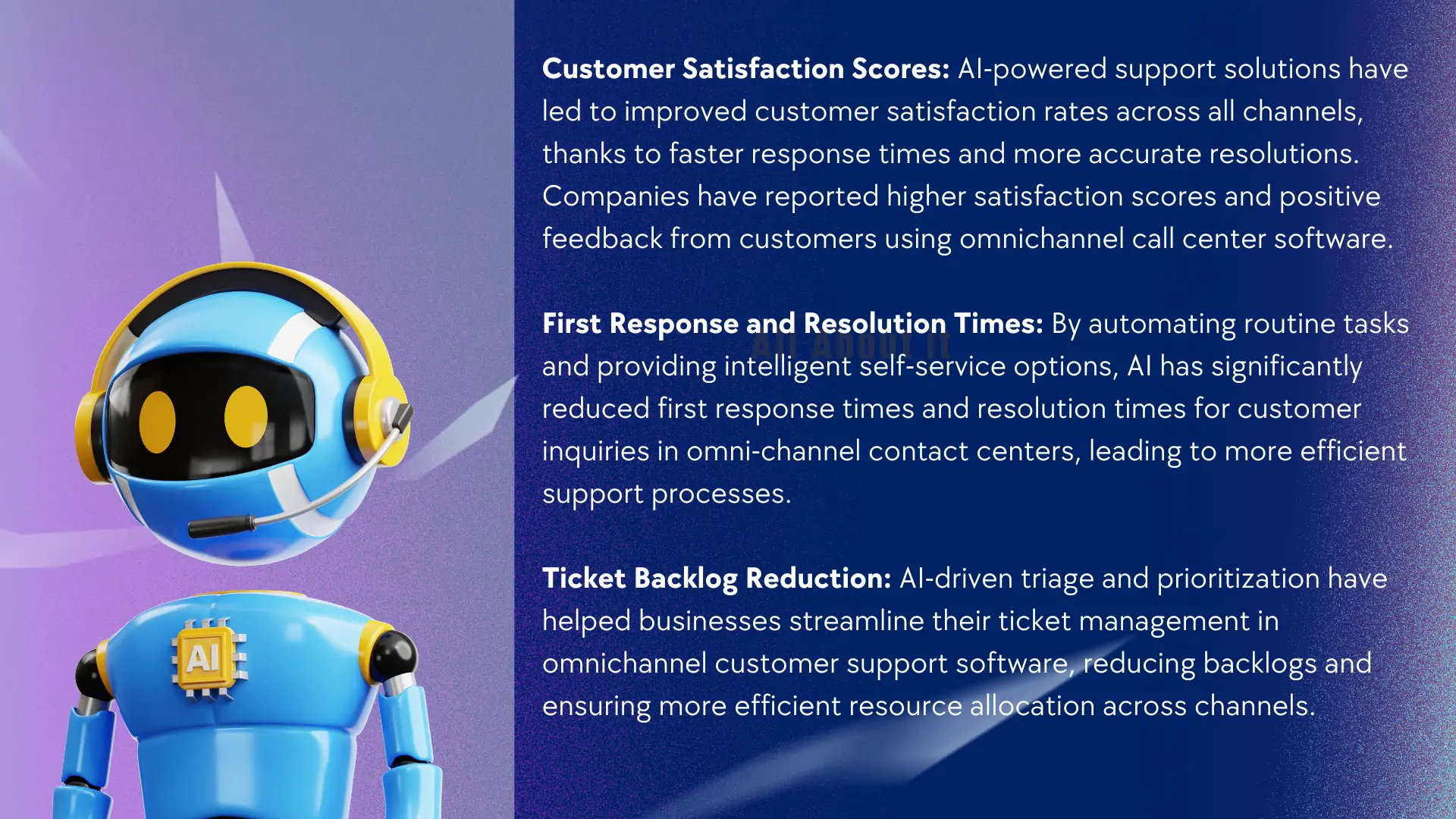
Impact of AI on Customer Support Strategies
The customer support landscape is undergoing a seismic shift, driven by the rapid integration of artificial intelligence (AI) technologies. As customer expectations for seamless and personalized experiences soar, businesses are turning to AI to revolutionize their support strategies, including omnichannel contact center solutions.
AI, through natural language processing, machine learning, and automation, provides solutions that significantly enhance efficiency, accuracy, and customer satisfaction in omnichannel support software.
This article delves into the evolution of AI in customer support, its practical applications, measurable impacts, challenges, and future trends, providing a comprehensive guide for organizations seeking to stay ahead in the AI-powered customer experience era, including omnichannel call center strategies.
Evolution of Customer Support: Pre-AI to AI-Enhanced Systems
Customer support has come a long way from the traditional models of the past, where businesses heavily relied on human agents to handle customer inquiries. This approach often led to long wait times and inconsistent experiences, frustrating customers and hampering overall satisfaction in omnichannel contact centers.
The integration of AI in customer support started with the introduction of chatbots and automated response systems in cloud call centers. While these early AI implementations offered some efficiency gains by automating basic tasks, they frequently fell short of providing satisfactory resolutions to complex queries that required deeper understanding and context.
Today, we stand at the forefront of a customer support renaissance, with leading companies like Amazon, Apple, and Google spearheading the adoption of advanced AI technologies in their omnichannel cloud contact center strategies. Customers’ expectations for seamless and personalized support experiences have driven this shift, as they increasingly recognize the potential of AI to enhance their journey across all channels.
Advancements in AI Technologies and Their Implementation in Support Strategies
The true power of AI in revolutionizing customer support lies in three key technological advancements:
1. Natural Language Processing (NLP): NLP enables AI systems to accurately understand and interpret human language, facilitating more natural and contextual interactions across omnichannel contact center touchpoints. By analyzing the intent, sentiment, and nuances of customer queries, NLP-driven solutions can provide more relevant and personalized responses, improving the overall quality of support.
2. Machine Learning (ML): ML algorithms allow AI systems to learn and improve over time, enabling predictive support and tailored experiences in omnichannel call centers. By analyzing historical data and user behavior patterns, ML models can anticipate customer needs and proactively offer solutions, enhancing customer satisfaction and reducing support workloads.
3. Automation Tools: AI-powered automation tools streamline workflows, reducing response times and minimizing human intervention in routine tasks for omnichannel contact center solutions. From intelligent routing and prioritization to self-service knowledge bases, these tools enhance efficiency and productivity, freeing up human agents to focus on more complex inquiries across multiple channels.
Companies like Sephora and Stitch Fix have successfully implemented these technologies in their omnichannel customer support software and omnichannel software solutions. Sephora uses AI-driven virtual assistants for personalized product recommendations and makeup tutorials. Conversely, Stitch Fix employs ML algorithms to analyze customer preferences and curate customized clothing selections, thereby delivering exceptional customer experiences across all touchpoints.
Measuring the Impact of AI on Customer Support Outcomes
The impact of AI on customer support can be quantified through several key performance indicators (KPIs) for omnichannel contact center operations:
Beyond operational metrics, the positive impact of AI extends to customer retention and loyalty in omnichannel contact center solutions. Companies leveraging AI in customer support often see higher retention rates and increased loyalty, which translates into tangible revenue growth.
Challenges and Ethical Considerations in AI Deployment
While the benefits of AI in customer support are clear, its deployment is not without challenges and ethical considerations that must be addressed in omnichannel call center strategies:
Integration Complexities: Integrating AI systems with existing infrastructure and processes can be complex, requiring significant upfront investment and technical expertise for omnichannel contact center solutions. Careful planning and execution are necessary to ensure a smooth transition.
Ongoing Training and Maintenance: AI models require continuous training and fine-tuning to ensure accurate performance and adapt to evolving customer needs across all channels, adding an ongoing maintenance cost for businesses using omnichannel cloud contact center software.
Data Privacy and Security: As AI systems process and learn from customer data, there are valid concerns around data privacy, security, and compliance with regulations like GDPR and CCPA in omnichannel customer support software. Companies must implement robust data governance frameworks and security measures to protect customer information.
Transparency and Bias: Ensuring transparency in AI decision-making and mitigating potential biases in algorithms is crucial to maintaining trust and fairness in customer interactions across all omnichannel contact center touchpoints. Algorithms must be designed and monitored with these considerations in mind.
Human Job Displacement: Some customer support specialists express anxiety about job security due to AI’s increasing capabilities in omnichannel call centers. Responsible implementation and workforce reskilling are essential to address these concerns and ensure a smooth transition.
Addressing these challenges requires a thoughtful and ethical approach, involving cross-functional collaboration, clear governance frameworks, and ongoing monitoring and adjustment for omnichannel contact center solutions.
Future Trends and Predictions for AI in Customer Support
The future of AI in customer support is poised for exponential growth and innovation, impacting omnichannel contact center strategies. Here are some key trends and predictions:
Conversational AI: The adoption of conversational AI technologies will continue to rise, enabling more natural and context-aware customer interactions across multiple channels in omni-call centers, such as voice assistants and chatbots.
Multimodal Experiences: AI will increasingly leverage multimodal inputs (text, voice, images, and video) to provide more immersive and personalized support experiences in omnichannel cloud contact centers, enhancing the overall customer journey.
Predictive Support: ML will drive proactive and predictive support in omnichannel customer support software, anticipating customer needs and suggesting solutions before issues arise, further improving efficiency and customer satisfaction.
Hyper-Personalization: AI will enable hyper-personalized customer experiences by analyzing vast amounts of data and tailoring interactions to individual preferences and behavior patterns across all omnichannel contact center touchpoints, creating a more tailored and engaging support experience.
AI and Human Collaboration: Rather than replacing human agents, AI will augment their capabilities in omnichannel contact centers, enabling seamless human-AI collaboration for complex inquiries and empathetic interactions, leveraging the strengths of both technology and human expertise.
As AI continues to evolve and become more sophisticated, it is expected to play an increasingly prominent role in customer support strategies across various industries, including omnichannel call center software. To stay ahead, organizations should:
Adopt a phased and iterative approach to AI integration in their omnichannel contact center solutions, starting with low-risk areas and scaling up gradually based on learnings and results.
Invest in upskilling and reskilling their workforce to work alongside AI systems effectively in omnichannel cloud contact centers, fostering a culture of continuous learning and adaptation.
Prioritize ethical AI principles, ensuring transparency, fairness, and accountability in AI decision-making processes for omnichannel customer support software.
Continuously monitor and adjust AI models based on customer feedback and evolving industry trends, maintaining a customer-centric approach in their omni-channel call center strategies.
VI. Frequently Asked Questions
1. How can small to medium enterprises (SMEs) afford to integrate AI into their customer support and omnichannel contact centers?
While AI implementation can be capital-intensive for larger enterprises, SMEs can leverage cloud-based AI solutions and managed services to reduce upfront costs for their omni-channel call center software. Additionally, many AI vendors offer scalable pricing models and freemium plans, making AI more accessible to businesses of all sizes.
2. What are the risks of over-relying on AI for customer support?
Reliance on AI can lead to a lack of human empathy and emotional intelligence in customer interactions. It’s crucial to strike a balance, leveraging AI for routine tasks and human agents for complex inquiries and empathetic support. Additionally, contingency plans should be in place to handle AI system failures or errors.
3. How can companies ensure their AI systems comply with international data protection laws?
Ensuring compliance with data protection laws like GDPR and CCPA requires implementing robust data governance frameworks, conducting regular audits, and incorporating privacy-by-design principles into AI system development. Partnering with reputable AI vendors that prioritize data privacy and security is also essential.
Conclusion
The impact of AI on customer support strategies is undeniable, offering a myriad of benefits from improved operational efficiency to enhanced customer experiences. However, it is paramount to implement AI responsibly and ethically to mitigate risks and ensure long-term success
As the future unfolds, businesses that strategically embrace AI and prioritize ethical principles will gain a competitive edge, fostering customer loyalty and driving revenue growth.




